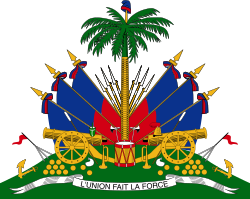| Party | First round | Second round | Total
seats |
|---|
| Votes | % | Seats | Votes | % | Seats |
|---|
| Haitian Tèt Kale Party | 246,668 | 22.14 | 1 | 359,120 | 35.25 | 4 | 5 |
| Fanmi Lavalas | 115,378 | 10.35 | 0 | 76,796 | 7.54 | 0 | 0 |
| Platfòm Pitit Desalin | 94,091 | 8.44 | 0 | 56,899 | 5.58 | 0 | 0 |
| Rassemblement des Patriotes Haïtiens | 67,194 | 6.03 | 0 | 149,918 | 14.71 | 1 | 1 |
| Vérité | 67,036 | 6.02 | 0 | | 0 |
| Alternative League for Haitian Progress and Emancipation | 54,376 | 4.88 | 0 | | 0 |
| Reseau National Bouclier | 48,214 | 4.33 | 0 | 108,745 | 10.67 | 1 | 1 |
| Konbit Pou Ayiti | 44,131 | 3.96 | 1 | | 1 |
| Haiti in Action | 42,924 | 3.85 | 0 | 87,959 | 8.63 | 1 | 1 |
| Struggling People's Organization | 42,485 | 3.81 | 0 | 37,493 | 3.68 | 0 | 0 |
| Konvansyon Inite Demokratik | 36,299 | 3.26 | 0 | 52,613 | 5.16 | 0 | 0 |
| Ansanm Patriyot pou Lavni Ayiti | 32,620 | 2.93 | 0 | | 0 |
| Rally of Progressive National Democrats | 31,992 | 2.87 | 0 | | 0 |
| Fusion of Haitian Social Democrats | 28,320 | 2.54 | 0 | | 0 |
| Parti Concorde Nationale | 27,369 | 2.46 | 0 | | 0 |
| Inite Patriyotik | 20,197 | 1.81 | 0 | | 0 |
| Consortium National des Partis Politiques Haïtiens | 17,271 | 1.55 | 0 | 43,128 | 4.23 | 1 | 1 |
| Mouvement Revolisyone Ayisyen | 16,388 | 1.47 | 0 | | 0 |
| Mouvement de Solidarite pour l'Avancement d'une Nouvelle Haïti | 10,049 | 0.90 | 0 | 25,352 | 2.49 | 0 | 0 |
| Federalist Party | 8,357 | 0.75 | 0 | | 0 |
| Konbit Travaye Peyizan pou Libere Ayiti | 7,391 | 0.66 | 0 | | 0 |
| Renmen Ayiti | 6,661 | 0.60 | 0 | | 0 |
| CANANN | 5,261 | 0.47 | 0 | | 0 |
| Kombit Liberasyon Ekonomik | 4,848 | 0.44 | 0 | | 0 |
| Entente Nationale des Travailleurs pour le Reveil d'Haïti | 4,318 | 0.39 | 0 | | 0 |
| Rassemblement des Nationaux Démocrates Volontaires pour l’Unité Salvatrice | 2,557 | 0.23 | 0 | | 0 |
| Konbit pou Rekonstwi Haïti | 2,450 | 0.22 | 0 | | 0 |
| Front Uni pour la Renaissance d'Haïti | 2,380 | 0.21 | 0 | | 0 |
| MOPANOU | 2,279 | 0.20 | 0 | | 0 |
| Parti pour la Libération des Masses et l'Intégration Sociale | 1,606 | 0.14 | 0 | | 0 |
| Force Démocratique Haïtien Intégré | 970 | 0.09 | 0 | | 0 |
| Fwon Revolisyone pou Entegrasyon Mas Yo | 535 | 0.05 | 0 | | 0 |
| Independent | 4,994 | 0.45 | 0 | | 0 |
| None of the above | 16,756 | 1.50 | – | 20,843 | 2.05 | – | – |
| Total | 1,114,365 | 100.00 | 2 | 1,018,866 | 100.00 | 8 | 10 |
|
| Valid votes | 1,114,365 | 91.76 | | 1,018,866 | 89.53 | | |
|---|
| Invalid/blank votes | 100,060 | 8.24 | | 119,190 | 10.47 | | |
|---|
| Total votes | 1,214,425 | 100.00 | | 1,138,056 | 100.00 | | |
|---|
| Source: [8] |
